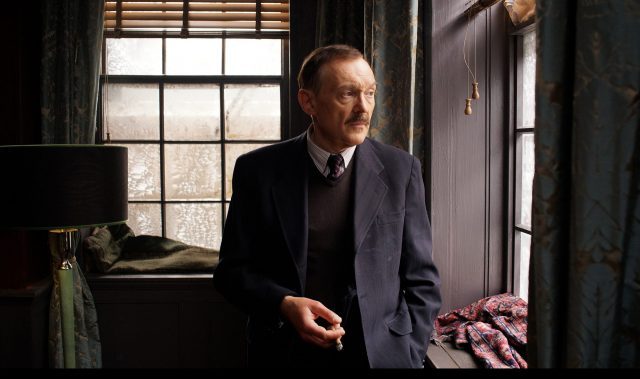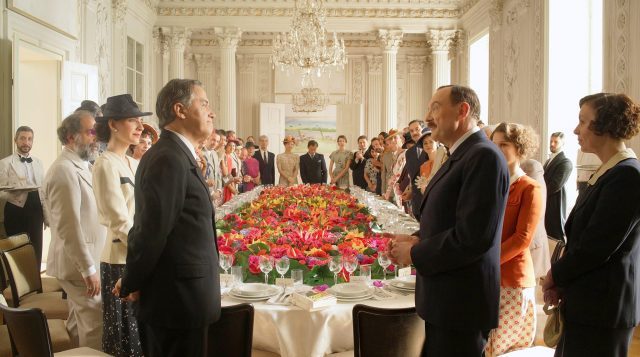
Josef Hader gives a powerful performance as exiled Austrian writer Stefan Zweig in moving biopic by Maria Schrader
STEFAN ZWEIG: FAREWELL TO EUROPE (VOR DER MORGENRÖTE) (Maria Schrader, 2016)
Lincoln Plaza Cinema
1886 Broadway at 63rd St.
Opens Friday, May 12
212-757-2280
www.firstrunfeatures.com
www.lincolnplazacinema.com
 Writer, actor, and former cabaret star Josef Hader gives a deeply intelligent, intensely gentle and thoughtful performance as Austrian writer Stefan Zweig in Maria Schrader’s moving biopic, Stefan Zweig: Farewell to Europe, opening May 12 at Lincoln Plaza. The episodic film follows the exiled Jewish writer as he and his second wife, Lotte (Aenne Schwarz), try to find a new home as Fascism takes hold across Europe. He is a man without a country, and it profoundly troubles him; he grows more and more brittle over the course of a prologue, four chapters, and an epilogue that follows him from Rio de Janeiro and Buenos Aires to Bahia, New York, and Petrópolis between 1936 and 1942. But none of them is his beloved Austria. “Apart from the personal joys your country has given me, apart from its beauty, its daring architecture . . . there is an even more powerful impression that I would like to share with you,” he tells Brazilian foreign minister José Carlos de MacedoSoares (Virgílio Castelo) and an adoring crowd gathered around a gorgeously designed long table for a celebration in his honor at the Jockey Club in Rio. “Every nation, in every generation — and therefore ours too — must find an answer to the most simple and vital question of all: How do we achieve a peaceful coexistence in today’s world despite all our differences in race, class, and religion? And it seems to me that Brazil has found an answer, even though not only its vegetation but also its population are more diverse in color than in Europe. Since my arrival in the Bay of Rio, it has seemed to me like a vision of the future,” he concludes. At the XIV International P.E.N. Congress in Buenos Aires, he is interviewed by reporters who almost demand that he take a public position on Adolf Hitler and events in Germany and Austria, but he refuses to speak ill of his native land. “Where is the line between literature and politics?” his rival, Emil Ludwig, asks from the podium, insisting it is the writer’s responsibility to cry out against injustice. When Belgian author Louis Piérard (Vincent Nemeth) then reads a list of names of banned writers, including Zweig’s, Zweig buries his face in his hands, refusing to claim a place as a martyr for the cause. (However, the newspapers claimed he was crying. “What a disgusting vanity fair,” he wrote to his first wife, portrayed in the film by Barbara Sukowa.)
Writer, actor, and former cabaret star Josef Hader gives a deeply intelligent, intensely gentle and thoughtful performance as Austrian writer Stefan Zweig in Maria Schrader’s moving biopic, Stefan Zweig: Farewell to Europe, opening May 12 at Lincoln Plaza. The episodic film follows the exiled Jewish writer as he and his second wife, Lotte (Aenne Schwarz), try to find a new home as Fascism takes hold across Europe. He is a man without a country, and it profoundly troubles him; he grows more and more brittle over the course of a prologue, four chapters, and an epilogue that follows him from Rio de Janeiro and Buenos Aires to Bahia, New York, and Petrópolis between 1936 and 1942. But none of them is his beloved Austria. “Apart from the personal joys your country has given me, apart from its beauty, its daring architecture . . . there is an even more powerful impression that I would like to share with you,” he tells Brazilian foreign minister José Carlos de MacedoSoares (Virgílio Castelo) and an adoring crowd gathered around a gorgeously designed long table for a celebration in his honor at the Jockey Club in Rio. “Every nation, in every generation — and therefore ours too — must find an answer to the most simple and vital question of all: How do we achieve a peaceful coexistence in today’s world despite all our differences in race, class, and religion? And it seems to me that Brazil has found an answer, even though not only its vegetation but also its population are more diverse in color than in Europe. Since my arrival in the Bay of Rio, it has seemed to me like a vision of the future,” he concludes. At the XIV International P.E.N. Congress in Buenos Aires, he is interviewed by reporters who almost demand that he take a public position on Adolf Hitler and events in Germany and Austria, but he refuses to speak ill of his native land. “Where is the line between literature and politics?” his rival, Emil Ludwig, asks from the podium, insisting it is the writer’s responsibility to cry out against injustice. When Belgian author Louis Piérard (Vincent Nemeth) then reads a list of names of banned writers, including Zweig’s, Zweig buries his face in his hands, refusing to claim a place as a martyr for the cause. (However, the newspapers claimed he was crying. “What a disgusting vanity fair,” he wrote to his first wife, portrayed in the film by Barbara Sukowa.)

Stefan Zweig: Farewell to Europe features beautiful compositions that are like paintings
Zweig demonstrates remarkable patience as he travels from place to place, constantly hounded by fans, journalists, and local dignitaries. He meets with various publishers, determined to keep on writing — he’s working on Brazil, Land of the Future as well as his autobiography, The World of Yesterday — but he is being worn down by all the requests he is receiving to help people get out of Europe. An avowed pacifist, he’s also disgusted by the war and tormented that he is unable to do anything about it. In her second feature, director and cowriter (with Jan Schomburg) Schrader, who is also an award-winning actress (Aimée & Jaguar, Nobody Loves Me) and has appeared in works by Agnieszka Holland, Margarethe von Trotta, and Doris Dörrie, among others, doesn’t force any issues, letting the story unfold in soft, subtle ways, focusing on Zweig’s complicated conscience. Cinematographer Wolfgang Thaler, a documentary veteran, crafts gorgeously composed shots, often set up like paintings. And the ending is an absolute gem. Zweig wrote novellas (Amok, Letter from an Unknown Woman), novels (Beware of Pity, Confusion of Feelings), and biographies of Marie Antoinette, Balzac, Magellan, Mary Queen of Scots, and others during his storied career, but his own tale is unforgettable, and one that strongly resonates today in an unsettled, violent world that would still so disappoint him.